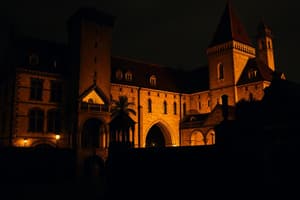Podcast
Questions and Answers
What does the word 'Renaissance' mean in French?
What does the word 'Renaissance' mean in French?
Rebirth
Which intellectual movement during the Renaissance emphasized the human being as the center of all things?
Which intellectual movement during the Renaissance emphasized the human being as the center of all things?
Humanism
Name one scholar from the Renaissance known for their contributions to science.
Name one scholar from the Renaissance known for their contributions to science.
Galileo Galilei
Who were some of the famous artists from the Renaissance period?
Who were some of the famous artists from the Renaissance period?
In which centuries did the Renaissance take place?
In which centuries did the Renaissance take place?
What were some key characteristics of the Renaissance?
What were some key characteristics of the Renaissance?
How did the Enlightenment lay the groundwork for revolutionary movements?
How did the Enlightenment lay the groundwork for revolutionary movements?
What were the main goals of the French Revolution?
What were the main goals of the French Revolution?
What were some impacts of the industrial revolution?
What were some impacts of the industrial revolution?
How have the Renaissance and Revolution influenced human civilization?
How have the Renaissance and Revolution influenced human civilization?
Flashcards are hidden until you start studying
Study Notes
The Renaissance and Revolution: Two Pivotal Eras in Human History
During the 14th and 15th centuries, a remarkable cultural and intellectual awakening swept across Europe. This period, known as the Renaissance, would lay the groundwork for the challenges and triumphs that followed in subsequent centuries. In contrast, the 18th and 19th centuries saw the rise of revolutionary movements that fundamentally transformed the political landscape, heralding new eras of societal change and progress.
The Renaissance: Rebirth and Rediscovery
The word "Renaissance" translates to "rebirth" in French, and indeed, this period witnessed a revival of classical learning, art, and philosophy. The Renaissance originated in Italy, but its influence soon spread throughout Europe. Several factors contributed to this revitalization:
- Humanism: A new intellectual movement that championed the human being as the center and measure of all things. This led to an emphasis on classical literature, art, and philosophy, as well as the development of new humanistic disciplines like history and politics.
- Scholarly pursuits: The Renaissance saw a renewed interest in the study of the natural world, mathematics, and science, as exemplified by scholars such as Galileo Galilei, Leonardo da Vinci, and Nicolaus Copernicus.
- Art and architecture: The Renaissance produced some of the greatest artists and architects in history, including Leonardo da Vinci, Michelangelo, and Raphael. These creators rediscovered and refined classical techniques and styles, revitalizing the arts and paving the way for later movements like Baroque and Romanticism.
The Renaissance also saw the rise of secularism, with many individuals turning away from the strict religious conformity of the Middle Ages. Instead, they embraced classical values and sought to create a more humane, empathetic, and rational society.
The Revolution: Change and Progress
The Enlightenment, a philosophical movement that emerged in the 18th century, laid the groundwork for the revolutionary movements that followed. The Enlightenment celebrated reason, tolerance, and the natural rights of man, and it challenged the traditional social, political, and religious hierarchies of the day.
The French Revolution, which began in 1789, was perhaps the most dramatic and impactful of the revolutionary movements. The French Revolution aimed to dismantle the feudal system, establish a republican government, and promote equality and democracy. Although the Revolution was marked by violence, bloodshed, and conflict, it also brought about profound changes, including the abolition of feudalism, the declaration of the rights of man, and the rise of the modern nation-state.
The industrial and scientific revolutions that followed the French Revolution brought about further changes to human society. The industrial revolution, which began in Great Britain in the late 18th century, saw the introduction of new technologies, such as steam engines and the spinning jenny, that led to massive increases in manufacturing and transportation. The scientific revolution, which began in the 17th century, saw the development of new scientific disciplines and the growth of knowledge across a wide range of fields.
Legacy and Impacts
The Renaissance and Revolution have had a profound and lasting impact on human civilization. The Renaissance laid the groundwork for the development of new artistic, philosophical, and scientific disciplines, while the revolutionary movements that followed it brought about profound changes to the political and social landscape.
Today, we continue to feel the influence of the Renaissance and Revolution in our daily lives. The Renaissance gave us a renewed appreciation for the humanities and the arts, while the revolutionary movements that followed it brought about profound changes to the political and social landscape.
In conclusion, the Renaissance and Revolution were pivotal eras in human history. They laid the groundwork for the modern world, and their influence continues to be felt in our daily lives. By studying these eras, we can better understand the developments and challenges that have shaped our world, and perhaps gain insights into the challenges that lie ahead.
Studying That Suits You
Use AI to generate personalized quizzes and flashcards to suit your learning preferences.




